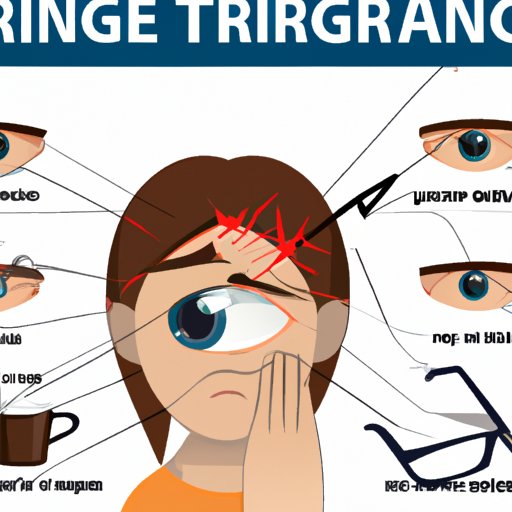Introduction
Have you ever experienced a sudden appearance of flashing lights or dark spots in your vision? Perhaps followed by a throbbing headache and nausea? If so, you may have had an ocular migraine. Ocular migraines, while not as well-known as traditional migraines, can be equally distressing. In this article, we’ll explore the possible causes and treatments for ocular migraines, including the effective management of their triggers.
Understanding the Root Cause of Your Ocular Migraines
Ocular migraines, also known as retinal, visual, or ophthalmic migraines, are a type of migraine headache that affect vision. Although the symptoms of ocular migraines can be alarming, they are generally harmless and usually resolve on their own after about 30 minutes to an hour.
The exact cause of ocular migraines is unknown. However, it’s believed that they are caused by temporary changes in blood flow to the ocular nerve or reduced blood flow to the retina, leading to a decreased or complete loss of vision in one eye. In some cases, ocular migraines can be a warning sign of an impending migraine headache or even a stroke. Understanding possible triggers for ocular migraines is crucial to avoiding future occurrences.
7 Possible Reasons Why You’re Experiencing Ocular Migraines
Some possible causes and triggers of ocular migraines may include:
Eye conditions
Eyesight problems such as nearsightedness, farsightedness, or astigmatism can cause ocular migraines, as well as other eye conditions like glaucoma, cataracts, or retinal detachment. If you experience ocular migraines frequently, it could be a sign that you need a new eyeglass prescription or that you have an underlying eye condition that requires treatment.
Hormonal changes
Many women report experiencing ocular migraines before or during menstruation, or during pregnancy. This is believed to be caused by changes in estrogen levels which can lead to fluctuations in blood pressure and blood flow.
Stress
Stress and anxiety can trigger migraines, including ocular migraines. When under stress, blood vessels may constrict and then suddenly dilate leading to the onset of an ocular migraine.
Food triggers
Some people may experience ocular migraines due to food triggers such as caffeine, chocolate, red wine, artificial sweeteners or processed meats. It is important to keep track of foods ingested prior to an episode to identify potential triggers.
Dehydration
Dehydration can cause the blood vessels in your head to constrict, leading to ocular migraines. Drinking water throughout the day is important to prevent dehydration.
Medication side effects
Some medications can cause ocular migraines as a side effect. If you have recently started taking a new medication and experience ocular migraines, consult your doctor to discuss alternative medications or dosages.
Genetic predispositions
Ocular migraines can run in families, therefore if your parents or siblings experience them, you may be more susceptible to ocular migraines yourself.
The Unpredictable Nature of Ocular Migraines: Causes and Treatments
Ocular migraines can occur without warning and their onset can differ between individuals. Sometimes people may experience symptoms such as visual flashing or scotoma, which are temporary, usually resolving within an hour. However, it’s important to see your doctor if you experience a sudden onset of ocular migraines or if you have any concerns.
Aside from prevention strategies, there are several different treatment options for ocular migraines, depending on the severity of the symptoms. Some may take prescription medications for relief, while others find natural or holistic remedies like meditation, acupuncture, or homeopathic remedies effective. It is important to consult a healthcare provider for personalized medical advice.
A Closer Look at Ocular Migraines: Symptoms and Causes Explained
The symptoms of ocular migraines can be quite different from traditional migraines. Ocular migraines tend to affect one eye at a time. Symptoms such as flashing or bright lights, shimmering or zigzag lines, or a blind spot in their central vision can last for about 30 minutes to an hour.
The cause of these visual symptoms is related to changes in blood flow to your eye. Small blood vessels that supply blood to your retina constrict or dilate suddenly, thus causing visual changes. There may not be a headache associated with ocular migraines, but some people may experience headaches following the visual symptoms.
Finding Relief: Managing Ocular Migraines and Their Triggers
If you have been diagnosed with ocular migraines, there are several lifestyle changes you can make to lessen the frequency and intensity of your symptoms. These include:
- Avoiding potential triggers such as stress, eye strain, and certain food and drink
- Staying hydrated and avoiding dehydration by drinking plenty of water throughout the day
- Regular exercise and stretching
- Getting enough rest and practicing stress reduction techniques, such as meditation or yoga
- Using protective eyewear like sunglasses to reduce glare and block bright sunlight
The Connection Between Stress and Ocular Migraines: Prevention and Treatment Tips
Stress is a common trigger for ocular migraines. Reducing stress or managing it effectively can help reduce the frequency of ocular migraines. Some techniques to reduce stress include:
- Regular exercise such as walking, running, swimming, or yoga
- Relaxation techniques such as deep breathing exercises
- Avoiding over-scheduling and prioritizing relaxing activities
- Working with a therapist or counselor to develop coping strategies
Conclusion
Ocular migraines can be a startling and distressing experience for many individuals. However, by understanding the possible causes of ocular migraines and making small lifestyle adjustments, it is possible to alleviate or even prevent them from happening. Always make sure to seek medical advice and consult with a healthcare provider to manage ocular migraines.
